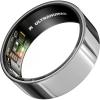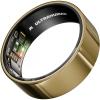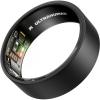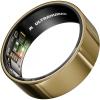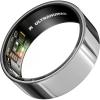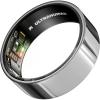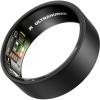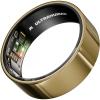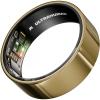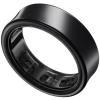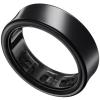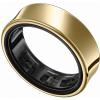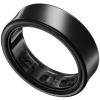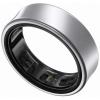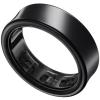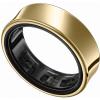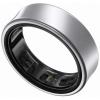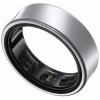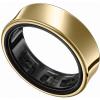Tiny gadget, big smarts. Which one deserves a spot on your finger?
When you think of wearable tech, you probably picture a smartwatch, fitness band, or maybe even a pair of AR glasses if you're that far into the future. But there’s a new contender in town that’s quietly slipping onto fingers everywhere: smart rings.
These unassuming bands of metal are packed with sensors that track everything from your heart rate and sleep quality to your body temperature and recovery readiness. And because they’re finger-based, smart rings can often track metrics with more accuracy than wrist-based wearables - all without a screen lighting up your bedroom at 3 am.
Today, we’re breaking down two of the best options available right now: the Samsung Galaxy Ring, hot off its 2025 launch, and the Ultrahuman Ring AIR, a wellness-first ring that’s been quietly building hype among biohackers, sleep nerds, and tech lovers alike.
Let's check them out!
Ultrahuman Ring AIR


Wellness-first, lightweight, and all about recovery.
The Ultrahuman Ring AIR is designed for people who care deeply about their health, not just in terms of steps and calories, but in how their body is recovering, adapting, and managing stress. This is the smart ring for folks who love reading their HRV like it’s their morning horoscope, or who treat sleep tracking like a competitive sport.
Made from aerospace-grade titanium and weighing just 2.4 to 3.6 grams, depending on ring size, the AIR is currently the lightest smart ring on the market. It doesn’t have a screen or vibrations - the idea is to keep distractions to a minimum and let you focus on you.
Where it really shines is in its tracking. It collects data on your heart rate variability (HRV), resting heart rate, skin temperature, blood oxygen, and even how often you fidget while sleeping. Then it crunches that data into useful insights like:
Movement Index - whether you’re getting enough activity each day
Recovery Score - how well your body is bouncing back from effort
Sleep Quality - including how aligned your sleep patterns are with your circadian rhythm
Stimulus Response - how your body is reacting to stress or stimulants
Circadian Phase Alignment - helping you optimise sleep/wake cycles based on your biology
It also includes unique health tracking for women, with menstrual cycle predictions, ovulation windows, and even a pregnancy mode - something that’s still rare in this space.
Battery life is solid too, lasting up to 6 days on a 2-hour charge. The ring connects to the Ultrahuman app (available on both Android and iOS), where all your data is visualised and interpreted with wellness-focused recommendations.
| PROS | CONS |
|---|---|
|
|
Samsung Galaxy Ring


Premium design meets Galaxy-level smarts.
Samsung has entered the smart ring space with style, and their first-gen Galaxy Ring is already looking like a strong contender. It’s aimed squarely at Galaxy phone users who want discreet, continuous health tracking - and maybe just a little bit of that futuristic edge.
The Galaxy Ring is made from lightweight titanium and comes in three sleek finishes (black, silver, and gold), with a concave inner band that gives it a minimal, modern vibe. Weight varies between 2.3 and 3.3 grams, depending on the size, and it’s built to last - with 10ATM water resistance, you can take it swimming, surfing, or just forget about it in the shower.
Where the Galaxy Ring really comes into its own is software integration. It ties directly into the Samsung Health app and uses Galaxy AI to analyse your heart rate, sleep stages, movement, and more. It then calculates a personalised Energy Score based on how ready your body is to take on the day. Think of it as a daily readiness briefing, but less military and more “maybe don’t skip breakfast.”
You also get advanced sleep tracking, including nightly snore detection, if you pair it with a Samsung phone and watch. Other neat features include:
Double Pinch Gestures to trigger your phone camera (yep, you can take selfies with your finger)
Find My Ring function to avoid a panicked couch-cushion search
7-day battery life, depending on how hard you push it
The catch? While it technically works with most Android phones running Android 11 and up, to get the full experience, you really need a Samsung Galaxy phone. And there’s no iPhone support at all - sorry, Apple users.
| PROS | CONS |
|---|---|
|
|
Galaxy Ring vs Ultrahuman Ring AIR: Which one’s better for you?
As always, the answer to these questions depends on what you're after.
If you’re a Samsung Galaxy phone user who wants an ultra-slick, AI-enhanced wearable that blends into your existing ecosystem, the Galaxy Ring is a no-brainer. It’s perfect for casual fitness fans, sleep-conscious users, and anyone who values clean hardware design with powerful software smarts.
If you’re looking for detailed health and recovery data, especially with a strong emphasis on stress management, sleep quality, and women’s health, the Ultrahuman Ring AIR goes deeper. It’s also platform-agnostic, so you can use it with both Android and iPhone, making it a more flexible choice overall.
Final thoughts
Smart rings are still relatively new, but they’re already proving that you don’t need a screen on your wrist to keep tabs on your health. Whether you’re looking to optimise your recovery, crush your sleep goals, or just track your wellness without another gadget buzzing at you, there’s now a ring for that. So what are you waiting for? Time to commit!


